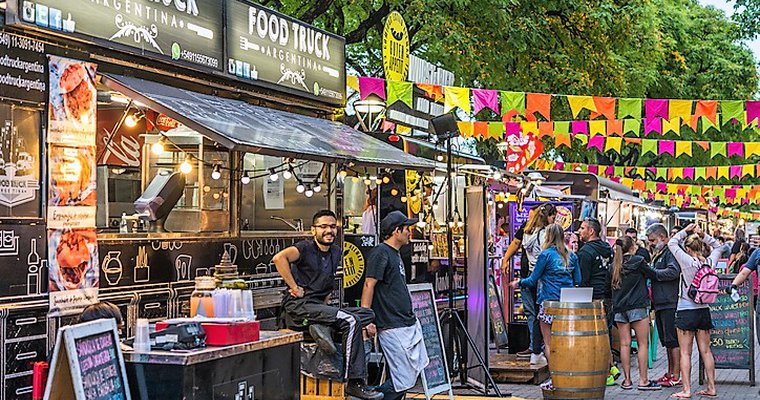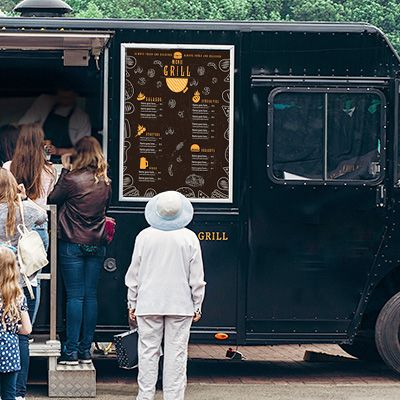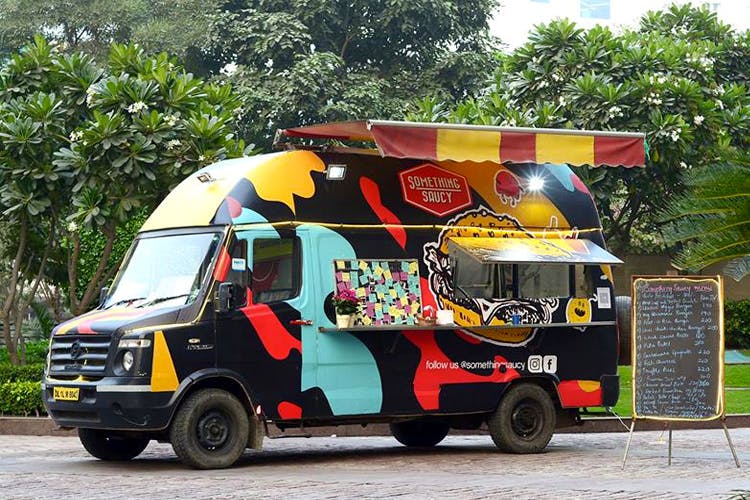
A food truck is a large vehicle equipped with a kitchen to cook and serve food. These mobile kitchens are often found at festivals, sporting events, office complexes, and other public gatherings. Food trucks serve a variety of cuisines, from traditional fast food items like burgers and tacos to more gourmet options like artisanal sandwiches, ethnic dishes, and fusion cuisine. They provide a convenient and often unique dining experience, allowing chefs to experiment with different menus and reach diverse customers without the need for a permanent location. Here’s Food Truck Business decoded for you!
Why are Food Trucks so popular off-late?
Food trucks have gained popularity for several reasons:
Convenience: They bring food directly to where people are, whether at events, workplaces, or popular public areas, making it easy for customers to grab a quick meal without going to a restaurant.
Variety and Creativity: Food trucks often offer diverse and innovative menus, ranging from traditional comfort foods to unique fusion dishes. This variety appeals to food enthusiasts looking for new and exciting culinary experiences.
Affordability: Operating a food truck is generally less expensive than running a brick-and-mortar restaurant. These lower overhead costs can translate to more affordable prices for customers.
Mobility: Food trucks can move to different locations, reaching a wider audience and adapting to changing customer demands. They can appear at festivals, farmers’ markets, concerts, and other events where large crowds gather.
Community and Culture: Food trucks often contribute to the local culture and community vibe. They can create a festive atmosphere and encourage social interaction among customers.
Social Media and Marketing: Many food trucks effectively use social media to announce their locations, menu specials, and events, creating a loyal following and generating buzz.
Quality and Freshness: Despite their mobile nature, many food trucks prioritise using fresh, high-quality ingredients, often sourced locally, which appeals to health-conscious consumers.
Entrepreneurial Opportunities: For chefs and food entrepreneurs, food trucks provide a more accessible way to start a business compared to opening a traditional restaurant. This has led to a boom in the industry with many new and innovative food concepts.

What are the costs involved in running a Food Truck Business?
There are two types food truck costs to be kept in mind while starting your own business – Fixed Cost and Variable Cost.
Fixed Cost includes the following costs :
- Cost of the Truck – This varies depending on whether you are purchasing a new truck, purchasing an old truck, or leasing out a food truck for your business.
- Kitchen Equipment Cost – The equipment needed for cooking depends on the cuisine that you want to sell at the truck. However some basic equipments that you will need are Oven, Fryer, Griller, Refrigerator, Freezer, Sink, etc. The total cost of all these equipments will give you the kitchen equipment cost.
- Permits & Licenses Cost – Even food trucks need permits and licenses from the local Municipal Department for smoothing running. The cost of getting these documents and permits makes up your Licenses cost.
- Truck Customisation & Wrap Cost – Every truck needs to be painted and wrapped in a customised design based on your concept. Your branding is also needed on the truck. The total of these costs make up the customisation cost.
- Initial Inventory & Supplies Cost – To start your truck you will need an initial supply of food ingredients, cooking utensils, packaging materials, etc. to fulfill those customer’s orders. The total cost of these items will give you your Initial Supplies Cost.
- Insurance Cost – Different types of insurance like Vehicle Insurance, Fire Insurance etc will also add up to your fixed cost.
- Technology Cost – This is the cost of all your technical needs like Point of Sale (POS) system, tablets, any other softwares etc.
The Variable Cost is the ongoing cost of keeping the food truck running smoothly. This will be recurring cost, which you will have to bear either monthly, or annually based on the cost. The different types of variable costs are:
- Food & Beverage Supplies – The ongoing cost of purchasing ingredients and beverages for sale. This is usually a weekly, bi-weekly or monthly cost based on when you take your inventory.
- Fuel – This is also a regular cost and is needed for the running of truck, specially from one place to another. The volume of the cost generally depends on the average of the truck.
- Maintenance & Repair – This is the cost for regular maintenance of the food truck and repairs as and when the need arises. Generally when such commercial grade equipments are in use constantly the need for some maintenance or repair does arise monthly.
- Staffing – Even though a food truck does not require a lot of staff but it does need some staff to help you prepare the dishes and keep the counters and truck clean. Their salaries will be a recurring monthly cost.
- License Renewal Costs – Annual or bi-annual renewal costs of the licenses is also a variable cost.
- Marketing & Promotion – Since a food truck is moving or is able to target only one locality at a time if its stationary, the truck has to invest in social media marketing and promotions to keep the customers engaged and informed about its current location and new products etc. if you hire an agency or do it yourself – it is a recurring monthly cost.
- Utilities Cost – The cost for electricity, water and waste disposal is also a monthly cost, without which the food truck cannot run smoothly.
- Commissary Fees – If you have a truck where everything is cooked there itself then you need not consider this cost, however if you have a menu where the food is first pre-prepared or stored at some cloud kitchen and then forwarded to your truck for final preparation then the rentals for that commercial space will also be a recurring monthly cost.
Some other costs are Event fees (this is the cost for participating in food festivals, events, fairs, or society events to increase visibility of the truck) and Parking Fees ( which is the cost for parking the truck in designated food truck areas).

Even though food truck is simpler to run as compared to a proper brick and mortar restaurant there are certain strategies you should keep in mind in order to run your food truck successfully. These are:
Research and Planning
- Market Research: Understand the local market thoroughly, identify your target customers and their demands, and analyse your competitors. Develop a detailed business plan, based on your findings, outlining your goals, target market, menu, pricing, marketing strategy, and financial projections.
Quality and Unique Offerings
- Unique Menu: Offer unique, high-quality, and diverse menu items that stand out from the competition.
- Fresh Ingredients: Use fresh and high-quality ingredients to ensure the best taste and customer satisfaction.

Efficient Operations
- Location: Choose high-traffic locations where your target customers are likely to be. Be prepared to move to different locations based on demand.
- Timing: Operate during peak hours to maximize sales, such as lunch hours in business districts or evenings at popular spots.
- Speed and Efficiency: Ensure fast and efficient service to keep customers happy and reduce wait times.
Marketing and Promotion
- Branding: Create a strong and memorable brand, including a catchy name, logo, and truck design.
- Social Media: Utilize social media platforms to announce your location, specials, and engage with customers. Regularly update your followers with enticing photos and posts.
- Customer Engagement: Engage with your customers through loyalty programs, promotions, and personalized service.
- Collaborations: Partner with local businesses, participate in food festivals, and attend events to increase visibility.
Financial Management
- Budgeting: Keep a close eye on your budget and control costs. Track expenses meticulously to ensure profitability.
- Pricing: Price your menu items competitively while ensuring you cover costs and make a profit.
- Cash Flow: Maintain a positive cash flow by managing inventory, monitoring sales, and keeping operational costs in check.
Customer Service
- Friendly Staff: Hire friendly and efficient staff who can provide excellent customer service.
- Feedback: Encourage customer feedback and act on it to improve your offerings and service.
Hygiene and Safety
- Cleanliness: Maintain high standards of cleanliness and hygiene in your truck and food preparation areas.
- Safety: Ensure food safety by following health regulations and guidelines. Regularly check equipment and facilities for safety compliance.
Adaptability
- Flexibility: Be prepared to adapt to changing market trends, customer preferences, and seasonal demands.
- Innovation: Continuously innovate your menu and services to keep customers interested and attract new ones.
Networking
- Industry Connections: Build connections with other food truck owners, suppliers, and industry professionals for support and collaboration.
- Community Involvement: Get involved in the local community through events, sponsorships, and partnerships to build a loyal customer base.
Legal and Compliance
- Compliance: Stay updated with local laws and regulations related to food trucks. Ensure compliance to avoid fines and legal issues.
- Insurance: Have adequate insurance coverage for your truck, employees, and business operations.
Additional Tips
- Menu Testing: Test your menu items with a small group of people before launching to gather feedback and make improvements.
- Consistent Quality: Ensure consistency in the taste and quality of your food to build a reliable reputation.
- Sustainability: Consider eco-friendly practices like using biodegradable packaging and reducing waste to appeal to environmentally conscious customers.
By focusing on these aspects, you can increase your chances of running a successful and profitable food truck business.

In conclusion, launching and running a successful food truck business requires meticulous planning, understanding your costs, implementing effective strategies, and providing exceptional service. By following these steps and staying adaptable to market trends, you can navigate the challenges and enjoy the rewards of entrepreneurship in the vibrant world of food trucks.
If you want to open your own food truck business then you can contact DinerGuru F&B Consultancy for end-to-end guidance Contact us Here. We will help you open your own food truck right from scratch till launch. We will guide you in acquiring a truck, its customisation, equipments, menu, staffing and marketing etc. We will help you realise your dreams!
